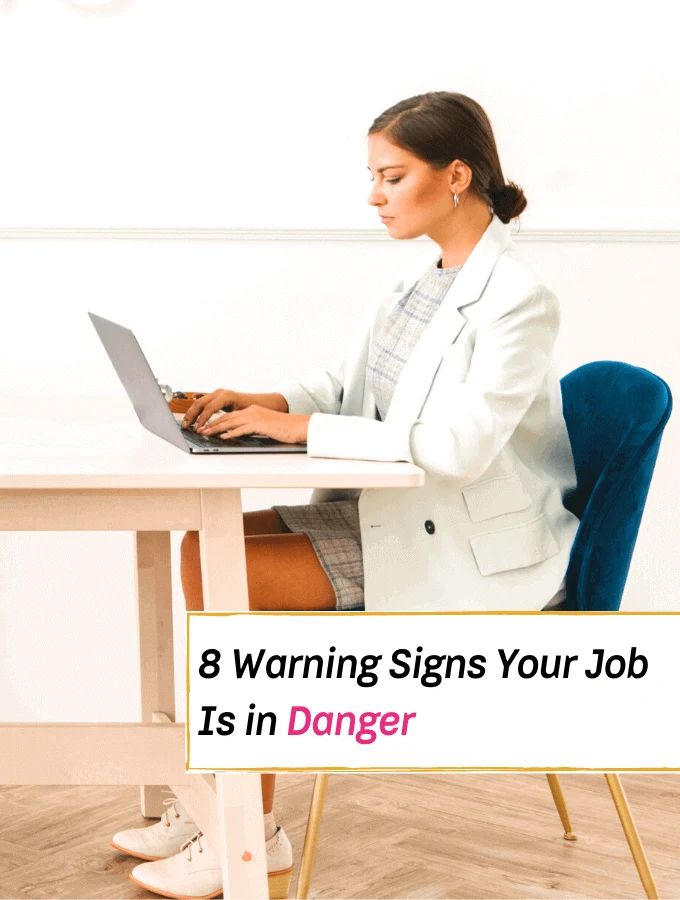
Everybody needs to pay their bills and keep their bank accounts positive, but that’s not easy without a job.
You rely on your job for financial stability. If it’s in jeopardy, then you need to know.
Luckily, there are some major red flags to look out for, so if you don’t want to be blindsided, then check out these eight major signs that your job is in danger.
Related Topics:
8 Warning Signs Your Job Is in Danger
1. Other Employees Are Being Let Go.
If people in your department or other coworkers with similar roles are being let go, then there’s a good chance that you’re next. Many employers gradually get rid of entire departments and redundant roles to cut costs.
Recent outsourcing is also a huge red flag, especially if duties similar to yours are being outsourced.
While your employer may simply be trying to trim the fat and make the company more efficient, there’s no way of knowing. Don’t expect to be given an honest answer when you ask; most companies will string you along for as long as they need you.
If you have a gut feeling that you’re going to be replaced, then it’s time to start polishing your resume and applying for other jobs.
2. Training a Replacement.
Is someone being trained to fulfill your duties? That could mean that you’re due for a promotion, but if there aren’t any openings, then it’s likely that you’re being replaced.
Is there so much extra work that it makes sense for your employer to hire an extra person to do your job? Is the company rapidly expanding?
Successful companies don’t waste resources on unneeded labor, so you should be concerned when they’re training someone else to do your job.
3. No New Projects or Responsibilities.
Valued employees are put on important projects. If they don’t plan to keep you for much longer, then they’re not going to give you any important responsibilities.
Although a lighter workload may feel nice, you shouldn’t get too comfortable. To see where you stand, try volunteering for more projects or asking your employer about your lightened workload. If they give a vague answer, then they’re probably just playing for time.
When your employer is being honest and forthright with you, they will give you detailed explanations that you can actually understand. Making sense of your boss’s words shouldn’t be like trying to read tarot cards.
A boss who plans to keep you around will communicate clearly with you; a boss who doesn’t value you will just feed you word salad until she or he is ready to let you go.
4. Unbearable Conditions.
According to the U.S. Department of Labor at dol.gov, employees who voluntarily quit are not entitled to unemployment benefits.
Employers have to fund a percentage of every unemployment claim, and unemployment claims can also affect their tax rate, so they’ll do whatever it takes to minimize the number of former employees who are eligible for unemployment benefits.
Although you may have a good relationship with your employer, that doesn’t mean that they won’t play dirty.
At the end of the day, they’re incentivized to do whatever’s in their legal power to make you quit. One of the easiest ways to do this is to make your work experience extremely unpleasant.
Your employer has to abide by labor laws and your employment contract, but they still have ways of getting rid of you. If you feel like your boss is trying to overwhelm you, then you should trust your instincts and start looking for something better.
5. Not Invited to Meetings.
Important workers are kept in the loop.
Unimportant workers aren’t. Important operational details and long-term plans are shared at meetings, so if you’re not routinely invited, then that means that your employers don’t think that you’re important enough to know such things.
After all, why would someone who’s going to be gone soon need to know about the company’s plans?
6. Distant Supervisors.
A study at paychex.com notes that most supervisors deliberate for less than three weeks before actually firing an employee. Firing someone can be emotionally draining, so most supervisors try to distance themselves from the employees whom they’re about to fire.
Your supervisor may simply be distant due to stress or personal problems, but you have no way of being certain. If you notice that your supervisor is acting cold or distant, then start looking for other signs that your job is in jeopardy.
7. Financial or Economic Woes.
No business is immune to economic strife. Recessions, tariffs, and new regulations may affect your industry in ways that are completely out of your control.
If you read the newspaper and notice that your industry is in trouble, then you may want to consider seeking another job. Even the most benevolent employer can’t pay you if they’re broke.
To protect yourself from a nasty surprise down the line, it pays to keep up to date on any news related to your industry.
8. Written Warnings and Reviews.
According to the legal experts at lawfirms.com, employers keep written records to protect themselves from wrongful termination lawsuits.
Warnings and negative reviews are a great way for your employer to establish a paper trail. If you’re getting negative reviews, then you should do whatever you can to improve your performance, but you should also accept the possibility that they may just be trying to get rid of you.
What Can You Do?
While you should work hard to demonstrate your value, there’s no guarantee that you’ll stop them from letting you go.
You can try talking to your supervisor, but at the end of the day, you should take whatever they say with a grain of salt. Your supervisor may genuinely care about you, but your fate may be out of their hands.
If you think that your job is at risk, then you must get ready to lose it.
You’re going to need as much money as possible to hold you over until you find a new job, so try to reign in your spending while you’re still employed.
The sooner you update your resume and apply for jobs, the sooner you’ll get calls and interviews.
Losing your job isn’t easy, but if you prepare yourself and know how to recognize the warning signs, then it will be that much easier to get back on your feet.
See also:
Check out, 14 Little Things That Will Dramatically Improve Your Work-Life (Remotely or at the Office), next!
You May Also Like:
Author: Everything Abode
Welcome to Everything Abode, your daily inspiration for every activity at home!
Our goal is to inspire you to live an elegant and chic lifestyle from the comfort of your home.
We’ll help you express yourself through authentic style, aesthetic beauty, and stylish home decor.
12 Easy to Make Homemade Crafts that Make Money
60 Fun Indoor Hobbies You Should Try at Home
15 Vintage Cleaning Tips (and Why Grandma Loved Them)
37 Beautiful Fantasy Landscape iPhone Wallpapers | 2023 List
14 Hacks That'll Help Solve Your Small(ish) Sleep Problems
7 Habits of People Who Lose Weight and Keep It off
Subscribe to Get the Tools That Make My Blog Successful!

When you join my newsletter, I'm going to send you insider advice and tools that I use to grow my blog! I only save the BEST for my email list so don't wait!


